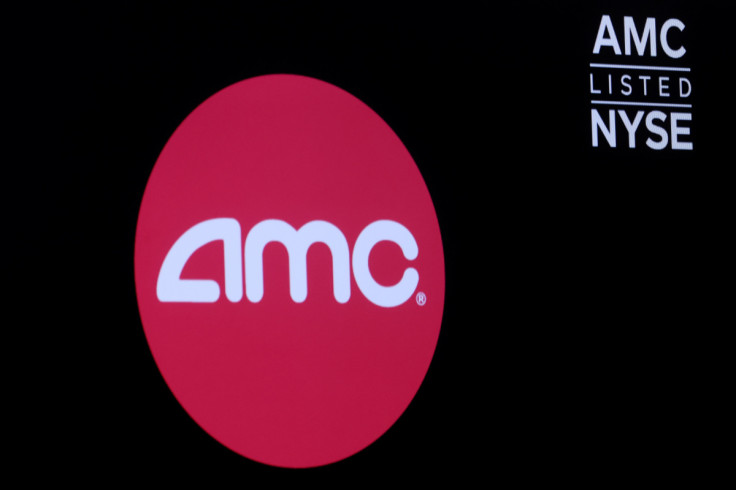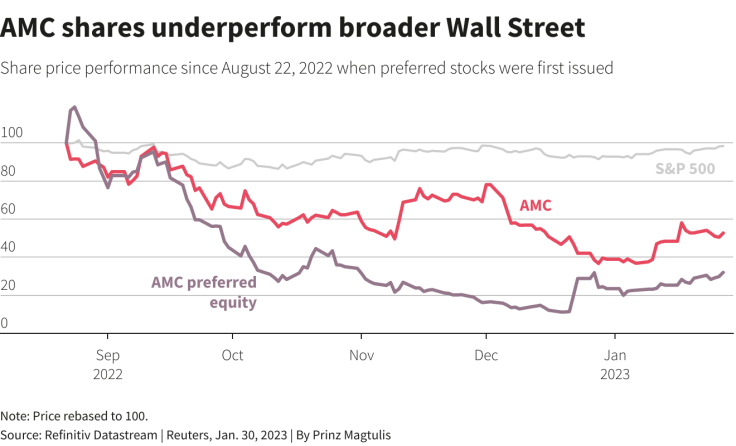Analysis-AMC Sets Unusual Shareholder Vote For Meme Stock Sale Approval

AMC Entertainment Holdings Inc, the movie theater operator that became a "meme stock" during the COVID-19 pandemic, has come up with an unusual way to win shareholder approval for stock sales that would raise cash, according to a regulatory filing and six corporate finance experts who reviewed it.
AMC raised more than $2 billion through stock sales in 2021, largely on the back of retail investors who sent its shares on a wild rally, along with other meme stocks such as GameStop Corp.
This helped it avoid the fate of bankrupt peer Cineworld Group LLC but also diluted its shareholders ninefold. Investor pushback against the dilution prompted the Leawood, Kansas-based company in July 2021 to cancel a shareholder vote on allowing it to issue more shares, its chief executive Adam Aron tweeted at the time.
Now, AMC is asking shareholders for authorization to further increase its common stock count tenfold. Instead of putting this to shareholders in a standalone vote for approval, it has bundled it with a separate proposal popular among investors to convert its deeply discounted preferred stock into common stock, a regulatory filing published by AMC on Jan. 27 shows.
Holders of the preferred stock will be allowed to vote on the matter alongside holders of common stock. Since there are 1.8 preferred shares for every common share of AMC, preferred stock voting in favor of the conversion can easily outnumber common stock voting against the authorization for more common stock sales, according to six corporate finance professors interviewed by Reuters.
"This increases the odds of (the new common stock authorization) passing this time," said Jacob Thomas, a professor of accounting and finance at Yale School of Management.
It was unclear how AMC shareholders will react on the bundling of the two issues into one vote, which is scheduled for March 14.
AMC spokespeople did not respond to a request for comment. In the Jan. 27 filing, AMC said securing authorization for common stock sales will provide it with "appropriate flexibility... without the expense and delay of a stockholders' meeting" for investors to vote solely on this matter. It added that its board will determine when to exercise the right it will be given to issue more shares.
AMC needs about 93 million new common shares to carry out the conversion of the preferred stock after giving effect to a proposed reverse stock split, but the filing shows it is seeking authorization to issue a total of 498.2 million common shares. That would give it 405.2 million common shares -- worth about $2.2 billion based on AMC's current stock price -- to issue after the conversion is completed.
Graphic: AMC shares underperform broader Wall Street-

FINANCES DETERIORATE
AMC needs the money to bolster its finances as many movie fans continue to prefer streaming over going to theaters. It has been posting net losses every quarter since it completed a debt restructuring in 2020.
Its debt pile had swollen to $5.4 billion as of the end of September, while its obligations on rent payments were worth $4.8 billion over the remainder of its leases. It only had cash in hand of $685 million as of the end of September.
Campbell Harvey, a Duke University finance professor, said tapping retail investors for more money was the responsible thing for AMC to do in light of its financial woes.
"Given that meme stock speculators can drive prices far from fundamentals, it makes sense for a company like AMC to issue stock when management believes its own stock is overvalued," Harvey said.
AMC created its preferred shares last August and gave them to its investors for free in the form of a stock dividend. Since then, it has raised more than $250 million by selling new preferred stock, most of it through a deal with hedge fund Antara Capital LP. It could issue preferred stock, even though it had run out of common stock to issue, because it relied on an authorization granted to its board in 2013 by its former owner, China's Dalian Wanda Group.
The value of its preferred shares plunged from a high of $10.5 to less $1, a big discount to its common shares that hovered between $5 and $8. AMC said in the Jan. 26 filing that it is proposing the conversion of preferred stock to common stock to eliminate the trading discount. Antara also made the conversion a condition for investing in AMC.
© Copyright Thomson Reuters 2024. All rights reserved.





















